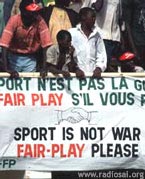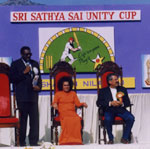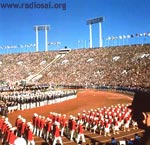|
SPORTS FOR CHARACTER
The cover story this time is the Annual Sports and Cultural
Festival of the Sai educational institutions that is celebrated
every year on 11th January. This is a gala event that commences
at about 7 A.M. in the Hill View stadium when Bhagavan comes
in procession, led by Sai Geetha, the Institute Brass Band,
students bearing standards, etc. That is how Darshan is given
that morning. The stadium gets packed even before sunrise,
and it is truly a glorious sight.
But there is much more to the festival than just the procession.
When Baba reaches the dias, He gets down and is escorted up
to His seat, and that is when the show gets on the road as
they say. There is now a wonderful march past, with almost
all students of all campuses taking part, smartly attired
and all that. After that, the Institute Flag is ceremoniously
hoisted by the Revered Chancellor who of course is Bhagavan
Baba. The participants then take an oath rather like athletes
do during the Olympics, and after that the proceedings get
under way. In the morning, the three Campuses of the Sri Sathya
Sai Institute of Higher Learning take turns and stage group
items of various kinds that range all the way from martial
arts and cultural pageants to thrilling acrobatics and fun
items of the type one sees during carnivals. The afternoon
session is reserved almost exclusively for the children of
the Primary School, and invariably they steal the hearts of
everyone. Elsewhere, many photos are presented, giving you
a glimpse of the atmosphere. We also offer the thrilling story
of what happened on the morning of sports day 1999.
Now a few words about the general atmosphere etc. Normally,
a sports event is one where participants compete with each
other. Here, on the other hand, there is co-operation rather
than competition. This approach is deliberate. These days,
there is too much emphasis on competition, forgetting the
basic objectives of sports. Next, the items are so organised
that every student of the entire Institute has some role or
the other to play. While some are visible on the ground offering
displays of various kinds, others work silently in the background
as facilitators - there are so many chores that need to be
done behind the scenes, and these boys and girls willingly
do it.
How come they don't want to be seen performing before the
public and earn their applause? The answer is simple. Every
single student and staff member is interested in only one
thing - pleasing Swami, and for this they are prepared to
do anything. They realise that this would mean that different
people would have to do different chores in keeping with their
individual abilities and this everyone cheerfully accepts.
It is all so automatic here that few realise how remarkable
such co-operation is.
How come the boys and girls are able to co-operate like this,
submerging their individual ego? The answer is simple - it
is hostel life that prepares them for such co-operation. In
the Institute, hostel residence is compulsory and few realise
what an impact this makes on the students. Elsewhere, college
students can enjoy the luxury of single rooms and cots to
sleep on. Here, the boys and girls live in dormitories, sharing
the room with many and sleeping on the floor. In every room
the mix is carefully arranged, bringing together students
from different parts of the country, speaking different languages,
from different backgrounds, etc. Pretty soon the room mates
know how to mesh smoothly with each other. That is what co-operation
is all about, and Swami's students learn this in a quite natural
way. Indeed this co-operation is visible not only on sports
day but on every occasion when students have to work together,
for example during festivals or Grama Seva.
 There
is a reason why I am mentioning all this. Time there was when
sports reminded one of character and other such values that
one cherished in life. Nowadays, sports has been transformed
into something else - it is mass entertainment, made possible
with big money. And there are all the attendant evils for
everyone to see. Once upon a time, cricket used to be considered
a game of gentlemen. Indeed it used to be said that the leaders
of England were made on the playing fields of Eton and Harrow
besides which there was the famous phrase - It's not cricket,
meaning it is not fair and a done thing. All that has gone
and cricket now is not only big money but seems plagued with
scandals from time to time. The attitude of spectators too
has changed and the media is in no small measure responsible
for this. Where football is concerned, there is worry about
hooliganism every time a certain country plays its rivals. There
is a reason why I am mentioning all this. Time there was when
sports reminded one of character and other such values that
one cherished in life. Nowadays, sports has been transformed
into something else - it is mass entertainment, made possible
with big money. And there are all the attendant evils for
everyone to see. Once upon a time, cricket used to be considered
a game of gentlemen. Indeed it used to be said that the leaders
of England were made on the playing fields of Eton and Harrow
besides which there was the famous phrase - It's not cricket,
meaning it is not fair and a done thing. All that has gone
and cricket now is not only big money but seems plagued with
scandals from time to time. The attitude of spectators too
has changed and the media is in no small measure responsible
for this. Where football is concerned, there is worry about
hooliganism every time a certain country plays its rivals.
Some of you may remember that recently we did a feature on
The Unity Cup One-day International Cricket Match. At the
end of the match, during the closing ceremonies, two important
speeches were made, one by Maestro Sunil Gavaskar who was
the driving spirit behind the match and the other by Clive
Lloyd of the West Indies, who also took a an active part in
organising the match. Transcripts of those speeches follow.
Gavaskar said:
Bhagavan, the many dignitaries here
today, ladies and gentlemen!
For me it is a unique privilege, to
welcome all of you here at the Sri Sathya Sai Hill View stadium.
You have been a witness to a unique match, a match where you
saw two of the fastest scorers of one day century, Sanat Jayasurya
and Saheed Afridi, opening the batting together. I can't think
of many an occasion when you could find these two fantastic
players opening the batting together. And it goes to show
that through sport there can be unity amongst countries.
The theme of this game has been precisely
that, to promote unity amongst countries through sport, to
get the countries to believe in a sporting spirit, to play
the game of life as a sport, where there will be winners and
there will be losers. But, at the end of the day it is how
you play the game which is very, very important.
I am delighted to welcome also some
of the legendary figures of the cricketing world here. To
my right is Mr. Hanif Mohammed [of Pakistan]. There have been
plenty of little masters but the original little master was
Hanif saab! To Hanif's right is Zahir Abbas a man whom Indian
cricket lovers know quite a lot about. And on to Bhagavan's
right, is Clive lloyd, the West Indian captain, the most successful
captain in the history of the game. And to his right is another
left-hander, Alvin Kallicharan.
May I now request Mr. Clive Lloyd to
say a few words?
That was the speech of Sunil Gavaskar, brief but just right
for the occasion. Sunil is not only a master batsman but very
good at many other things, like acting as master of ceremonies,
for example. And now, let us what Clive Lloyd said on that
occasion.
Thank you Sunny. 
Sai Baba, Your Excellencies, fellow
cricketers, ladies and gentlemen.
First I must tell you that I have a
great affinity with India and Indian cricket. My first test
match was played in India, my first test match as captain
was also played in India. So, it should be no surprise when
I say that I have a great affinity with India.
When Sunny asked me to be here for
this game, I had to say yes. Whenever he asks, it is a command
performance!
So I am pleased to be here, to witness
this great spectacle, to see this wonderful stadium come to
fruition, for which we have a lot of people to thank. But
I think it would be remiss of me to do so because I might
leave some names out. To all those people who have been involved,
I must say: you have done a marvellous job in a very short
time.
 The
world of sports in a developing nation is an important conduit
for the positive energies of our youth. Sports teaches discipline.
Sports provides challenges. Sports creates opportunities.
Sports now transcends social borders and often provides the
foundation for wholesome human development. The
world of sports in a developing nation is an important conduit
for the positive energies of our youth. Sports teaches discipline.
Sports provides challenges. Sports creates opportunities.
Sports now transcends social borders and often provides the
foundation for wholesome human development.
To all the young people here and all
the aspiring young crickters, I can say to you, you must know
that you have been blessed with special skills. Your talent
is a gift from God, what you do with that talent would be
your offering to God and gift to humanity. Do not take your
abilities for granted. Use them to great advantage. To do
so, you must supplement your natural skills with education.
There is no substitute for education.
A complete education, will complement your cricketing skills,
and provide you with a basis for personal development. That
in turn will enhance your career. 
As you might well know, 90 % of cricket
at advanced levels is played above the shoulders. It is one's
mental approach and suitable application to the game that
separates the average player from the great player.
In his well known book, BEYOND THE
BOUNDARY, historian C.L.R. James wrote with deep conviction
about the importance of mental attitude. The successful man
of the future will be a man of intelligence, with an imaginative
approach, combined with the attribute of mental toughness,
and the special ability to be mentally prepared for situations,
even before they develop.
In closing, I will urge you all to
improve every aspect of your game, especially your education.
As someone once said, the only place
where success comes before work is in the dictionary! Thank
you!
Sunil Gavaskar and Clive Lloyd belong to the older generation.
I wonder what the stars of today would say when they retire
and step down into ordinary life. Right now, most of them
seem to be too busy making money. What a tragedy that almost
everywhere in the world sport has moved away from character
building to money and fame, creating problems all over, including
with regard to security. But if there is a Shangrila amidst
all this it is here! We Hope you would reflect on some of
these issues even as you browse through our feature on our
Annual Sports day.
G.VENKATARAMAN
|